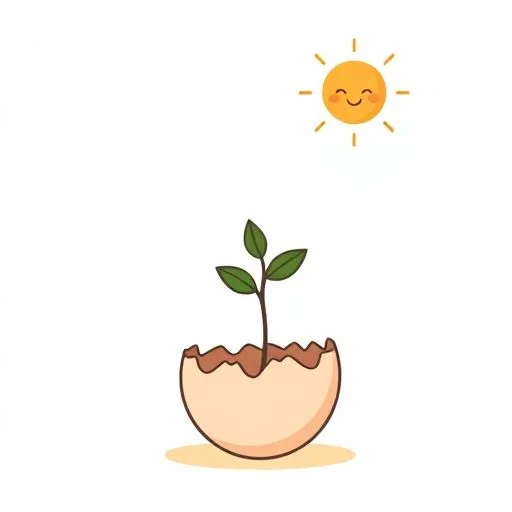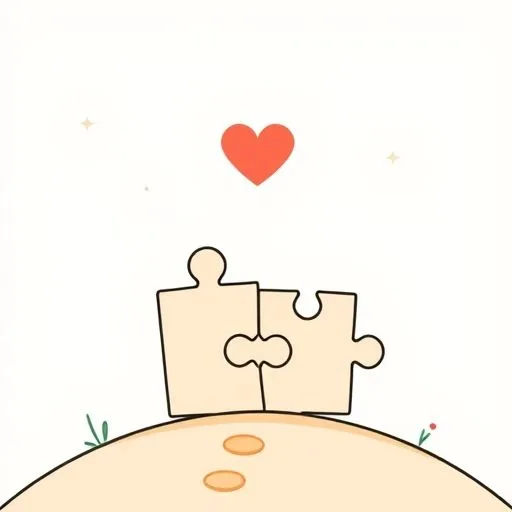
It’s late. The only sound is the steady breathing of the kids, fast asleep. I love this time of night. I saw you staring at your phone earlier, that little furrow in your brow. I wondered what was worrying you. So it was that news story—the one saying 95% of artificial intelligence projects fail (Source: AI engineers are being deployed as consultants and getting paid $900 per hour, Fortune, 2025-09-12).
I get it. You saw that too, right? An article like that sends your mind racing, doesn’t it? Wondering what kind of world our children will inherit, if we’re doing enough, if we’re doing the right things. But as I watched you, I thought about what happened at the park this afternoon. Remember? Our little one was crouched down for the longest time, just watching ants, before looking up at me and asking, “Dad, why do they all walk in a line?” In that small head, a pure, simple question. And it hit me. Maybe the answers we’re looking for aren’t in those complicated news articles. Maybe they’re right there, in questions just like that.
Why That 95% Figure Actually Brings Me Comfort

Honestly, that 95% failure rate actually brings me a sense of relief. You know how it is. We hear it from other parents, we see it online—the pressure to get the kids into coding camps, to make sure they don’t get left behind in the age of AI. It’s hard not to feel a sense of urgency, a fear that we might be letting them down if we don’t push them. Yet those billion-dollar projects? They often stumble on something deeper: You know what the researchers found? It’s a failure of something more fundamental: the creativity to see a problem differently, the ability to ask the right questions.
And that made me think of our child. The way a spoon becomes a spaceship, flying through the kitchen. The determined focus of trying to fit a square block into a round hole, over and over. To us, it might just look like clumsy play. But in those moments, our child is planting the seeds of success every single day. This feels like the core of balancing AI for busy parents—focusing on the human skills that tech can’t replicate.
The Garden of ‘Why’ You Tend to Every Single Day

Watching you, I see someone who understands this better than anyone. It was just the other night, wasn’t it? You were in the middle of making dinner, and our child pointed at the soup, fascinated by the tofu floating on top. You were busy, you could have just said, “That’s just what it does.” But you didn’t. You stopped, turned, and said, “That’s a great question. Why do you think the tofu floats?” You always do that. You meet a child’s question not with an answer, but with a bigger question.
It’s in those little moments that their world expands. Instead of just memorizing a fact, they learn to wonder. I know that your time, your patience in exploring those questions together, is the greatest education they could ever receive. You’re not just raising a child who knows the answers; you’re raising a person who knows how to ask their own questions in a world that will have very few easy answers.
When the Living Room Floor Becomes the Best Research Lab

I know the living room was a disaster zone again today. Toys, books, and crayon drawings everywhere. Sometimes I know you look at it and just sigh. But I love that beautiful mess. The blanket fort, the cardboard box car, the paper towel tube telescope… in that chaos, our child is building worlds, tearing them down, and creating them all over again. The kind of hands-on, three-dimensional imagination that a screen can never offer is growing right there on our living room floor.
It’s the courage to fail without fear and the power to create joy out of nothing.
Your quiet insistence on protecting that unstructured playtime—it’s such a source of wisdom. “You have to be bored to invent a new game,” you’ll say, letting them squirm for a minute before inspiration strikes. This kind of play builds the resilience and critical thinking they’ll need to navigate any technology safely.
How We’ll Get Through This Wave of Anxiety, Together

I see it sometimes, you know. On the days you come back from a coffee with other parents, or after scrolling through those parent groups online. Your shoulders seem a little heavier. The whispers of ‘who’s already learning a second language’ or ‘which program is the best’ can create a nagging anxiety. It’s impossible not to feel it.
But I hope you never forget that we are walking this path together. These quiet conversations, when we can look at each other and say, “It’s okay, we’re doing a good job,” this is what holds us steady. For a child who will grow up in an age without a roadmap, the best thing we can give them isn’t a map. It’s the deep, unshakeable confidence that they can find their own way. And those questions they ask today—about ants, tofu, anything—are the first steps on that path.
